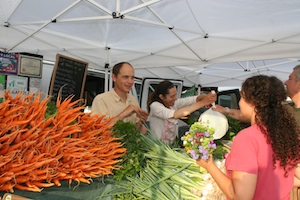This summer we’ve started taking a closer look at the new food safety laws that are hurtling toward us from the FDA. (Alright, hurtling might be an exaggeration, but the November 16th deadline for comments is coming quick.) The more we read, the more it becomes clear that FSMA (the Food Safety Modernization Act) will impact everyone and we all need to take a closer look at what’s coming.

Nobody cares more than us about the safety of the food leaving our farms. But we need to make sure the regulations are right for the 21st century – that they’re written for the small farms, the diverse farms, the innovative farms, and not just the monoculture mega-farms of old.
A great introduction to the impact that the rules will have on the beginning farmer is this one, written by our friend Roland McReynolds of the Carolina Farm Stewardship Association. Roland has been studying the new rules for months, and has some great insight for the rest of us.
(Note that some of the more dire references below will be somewhat alleviated by the Tester-Hagan amendment, which provides some exemptions to small farms. Even Tester-Hagan, however, won’t do everything to protect small farms from over-regulation, and we need to do what we can to make sure it’s as strong an amendment as it should be.)
*********************
At its core, the movement for local, organic food and farming is about aspiring to make lives better: Prosperous for farmers and farmworkers, healthy for all humankind, happy for the animals we depend on, and sustainable for the earth’s ecosystem. And the influx of beginning farmers pursuing agriculture as a career over the last several years has been one of the signal achievements of our movement. After forty years of slow and steady work to re-envision how we produce and consume food, young people, veterans and second-career-seekers are able to see the potential for making a rewarding, meaningful living in farming.
After a century that has industrialized the landscape and our diets, this hopeful trend of new farmers is a manifestation of the transformative power of local, organic agriculture, bringing people back to land with a mission to care for it and preserve it for future generations. And it is a trend that would be choked off by pending federal food safety rules, suffocating our chances for a better, healthier world along with it.
The 2011 Food Safety Modernization Act (FSMA) is as direct and real a threat to local, organic food as any other issue we face, including the corporate ownership of genes, taxpayer subsidies for industrialized production, and even global climate change. Indeed, because the catastrophic negative impacts of the FSMA rules for beginning farmers and new food distribution models would happen within a decade, the food safety challenge is arguably of more immediate concern; if we halt the growth of local food and opportunities for beginning farmers, we lose a critical means to fix those other longer-term problems.
But you don’t have to take my word for it that FSMA will make it impossible to succeed as a new farmer. FDA’s own data tells the story.

Beginning farmers almost always start small. Ninety-six percent of farms run by beginning farmers (i.e. farm principal operators with 10 years or less farming experience) have annual gross revenues less than $250,000.[1] Beginning farms are more likely than established farms to grow fruits and vegetables, to have direct-to-consumer sales, and to be located in metropolitan counties, where land values are higher.[2] Beginning farmers are less likely than established farms to inherit land or buy it from a relative; less likely than established farms to receive government payments; and more likely to have difficulty obtaining credit and financing for land purchases.[3] The average achieved net income for US farms is 10% of sales, and so is less than $25,000 for almost all beginning farms.[4]
And according to the FDA, the average annual cost to comply with FSMA’s produce rules for farms grossing less than $250,000 per year will be 6% of revenue.[5] Do the math, and then ask yourself why anyone would choose to start farming—to endure 12+ hour days, have an extra job off the farm, face crop loss risk—when the federal government is promising to take half the profits. It may be the understatement of the year when FDA, in an economic impact analysis, says that “the rate of entry of very small and small [farm] businesses will decrease” as a result of the produce rules.
The proposed FSMA produce rules govern every element of growing and harvesting crops, from worker hygiene and training, to the fertilizers farmers use, to expensive water tests and treatments, to integrating livestock and produce crops. Just as overwhelming is the companion proposed rule on preventive controls for fresh produce handling and other food processing. This rule treats local food hubs the same as 499-employee manufacturing plants, with disproportionate requirements for record-keeping and sanitization. Even though firms with 20 or fewer employees produce just 4% of the food sold in the US, firms of that size would bear 73% of the cost implementing FSMA’s preventive controls.[6]
In other words, the food hub movement will also be shut down as a result of FSMA, cutting off a critical market channel that allows farmers to scale-up while retaining a significant share of the value of their crops. And beginning farmers are especially vulnerable to the loss of this sales outlet.
As former USDA Deputy Secretary Kathleen Merrigan stated in a recent speech, the FSMA rules have the potential to “destroy some operations.” We must speak out if we expect to stop this. We must tell the stories of the young and beginning farmers who will bear the brunt of these regulatory abuses.
[1] 2011 USDA Agricultural Resource Management Survey
[2] Hunt, Alan and Gary Matteson, The Emergence of Retail Agriculture: Its Outlook, Capital Needs, and Role in Supporting Young, Beginning, and Small Farmers
[3] 2011 USDA Agricultural Resource Management Survey
[4] USDA: ERS Farm Balance Sheet data
[5] FDA Produce Standards Rule Regulatory Impact Analysis, p. 314
[6] FDA Preventive Controls Rule Regulatory Impact Analysis, p. 181, Table 65a